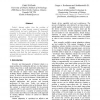Free Online Productivity Tools
i2Speak
i2Symbol
i2OCR
iTex2Img
iWeb2Print
iWeb2Shot
i2Type
iPdf2Split
iPdf2Merge
i2Bopomofo
i2Arabic
i2Style
i2Image
i2PDF
iLatex2Rtf
Sci2ools
114
click to vote
ICDE
2007
IEEE
2007
IEEE
A QoS-based Service Composition for Content Adaptation
Today’s Internet suffers from the problem of heterogeneity in client devices, network connectivity, content format, and users’ preferences. The framework presented in this paper tackles this problem using the approach of service composition to support distributed multimedia applications. The discussed framework for trans-coding multimedia streams uses self-organizing, resilient data distribution algorithms. The framework takes into consideration the profile of communicating devices, network connectivity, exchanged content formats, context description, and available adaptation services to find a chain of adaptation services that could be applied to the content. Part of the framework is a selection algorithm that finds the best sequence of adaptation services that can maximize the user’s satisfaction with the delivered content.
Related Content
| Added | 03 Jun 2010 |
| Updated | 03 Jun 2010 |
| Type | Conference |
| Year | 2007 |
| Where | ICDE |
| Authors | Khalil El-Khatib, Gregor von Bochmann, Abdulmotaleb El-Saddik |
Comments (0)

